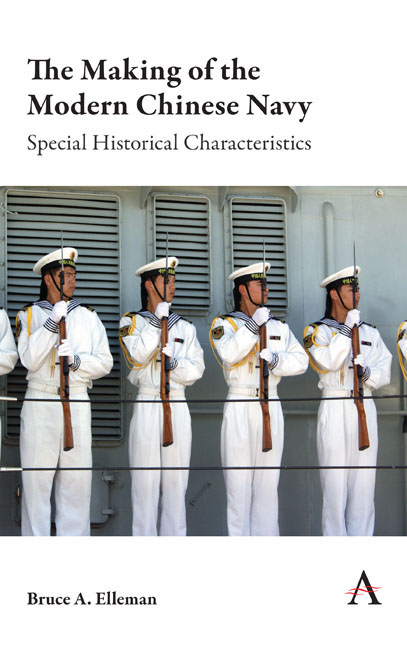Book contents
- Frontmatter
- Contents
- Introduction: The Special Characteristics of China's Maritime History
- 1 Battle of Bạch Đăng River (938)
- 2 Battle of Yaishan (1279)
- 3 Battle of Lake Poyang (1363)
- 4 Ming–Kotte War in Southeast Asia (1410–11)
- 5 Ming Loyalists Flee to Taiwan (1661–83)
- 6 Battle of Chuanbi (1839)
- 7 Sino-French War (1884–85)
- 8 Qing Beiyang Fleet's Defeat in the Battle of the Yellow Sea (1894)
- 9 Chinese Decision to Sink The Nationalist Navy as Blockships (1937)
- 10 Chongqing Mutiny Allowing the PLA to Cross the Yangzi River (1949)
- 11 The Taiwan Strait Crises (1954–55 and 1958)
- 12 China's Decision to Take the Paracel Islands from South Vietnam (1974)
- 13 Missile Blockade: The Taiwan Strait Crisis (1995–96)
- 14 The EP-3 Standoff and Diplomatic Resolution (2001)
- Conclusions: The Influence of History on the Formation of a Modern Chinese Navy
- Selected Bibliography
- Index
Conclusions: The Influence of History on the Formation of a Modern Chinese Navy
Published online by Cambridge University Press: 04 October 2019
- Frontmatter
- Contents
- Introduction: The Special Characteristics of China's Maritime History
- 1 Battle of Bạch Đăng River (938)
- 2 Battle of Yaishan (1279)
- 3 Battle of Lake Poyang (1363)
- 4 Ming–Kotte War in Southeast Asia (1410–11)
- 5 Ming Loyalists Flee to Taiwan (1661–83)
- 6 Battle of Chuanbi (1839)
- 7 Sino-French War (1884–85)
- 8 Qing Beiyang Fleet's Defeat in the Battle of the Yellow Sea (1894)
- 9 Chinese Decision to Sink The Nationalist Navy as Blockships (1937)
- 10 Chongqing Mutiny Allowing the PLA to Cross the Yangzi River (1949)
- 11 The Taiwan Strait Crises (1954–55 and 1958)
- 12 China's Decision to Take the Paracel Islands from South Vietnam (1974)
- 13 Missile Blockade: The Taiwan Strait Crisis (1995–96)
- 14 The EP-3 Standoff and Diplomatic Resolution (2001)
- Conclusions: The Influence of History on the Formation of a Modern Chinese Navy
- Selected Bibliography
- Index
Summary
Based on the 14 historical case studies discussed earlier, this study has sought to show some of the special characteristics that might impact the behavior of the contemporary Chinese navy. History influences all nations, but some more so than others. Arguably, China is one of the most retrospective nations on the planet, which means Chinese often utilize examples from their past to form contemporary strategies. These historical cases may be applied to new circumstances. A number of the most important historical characteristics will be highlighted in the following sections.
One of the most obvious Chinese characteristics is “face” as in “losing face” and “gaining face.” Because of the extreme “loss of face” involved with military defeat, later generations might chose not to dwell on valuable military lessons that might have otherwise been learned. For example, in 938 the Vietnamese used a clever ambush on the Bạch Đăng River to destroy an invading Chinese fleet. Three hundred and fifty years later, in 1288, the Vietnamese used the same ruse a second time with equal success, this time against a Mongol-led Chinese fleet. This second victory was only possible because the Han Chinese admiral never told his Mongol co-commander the history of the 938 defeat, so the Mongol admiral fell into the exact same trap. The highly selective use of historical lessons to favor one's successes over one's defeats occurs in other countries, of course, but seems to be more prevalent in “face” cultures like China.
Another critical Chinese characteristic is the belief in Mandate of Heaven, or the widespread perception that political legitimacy can switch from one dynasty to another succeeding dynasty. Most, but not all, Han Chinese accept the new dynasty without question and will fight for it, regardless of whether the new dynasty is Han or foreign. During the early Yuan dynasty, for example, it was not Mongols fighting in the massive sea battles to dominate China but primarily Han fighting Han. This occurred because of the widespread perception that the Mandate of Heaven had shifted from the Song to the Yuan dynasty. Thus, in one of China's largest sea battles at Yaishan in 1279, it was Han Chinese who carried out most of the fighting on both sides, with the Mongols the ultimate victors.
- Type
- Chapter
- Information
- The Making of the Modern Chinese NavySpecial Historical Characteristics, pp. 73 - 82Publisher: Anthem PressPrint publication year: 2019



